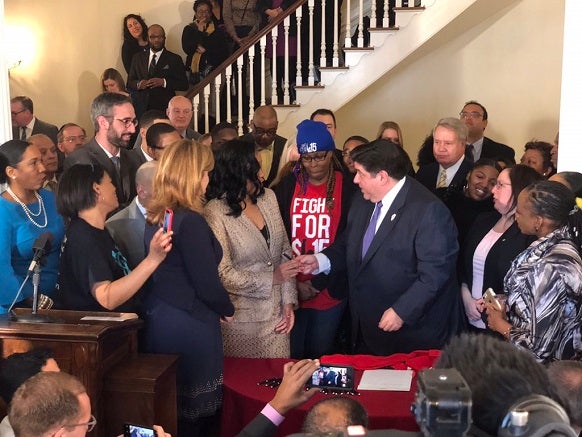Uncategorized
More Wins for Minimum Wage Hike

Elections have consequences. That’s not only the case at the federal level, but at all levels of government. Fortunately, workers in New Jersey and Illinois are beginning to see how supporting candidates who support them can benefit them where many need it the most – their wallets.
New Jersey lawmakers earlier this month became the fourth state in the U.S. to approve a minimum wage hike to $15 an hour, and a similar bill in Illinois was signed by Gov. JB Pritzker into law today. Both Pritzker and New Jersey Gov. Phil Murphy earned the endorsement of the Teamsters when they ran for office in 2018 and 2017, respectively.
“Today is a victory for the cause of economic justice,” Pritzker said. “I traveled the state for the last two years and promised the workers of Illinois that I would stand up for them and fight for 15. Today it’s my great honor to deliver on that commitment. “
“For far too long, too many of our fellow New Jerseyans have been struggling to survive on wages that have not kept up with the cost of living,” said Gov. Murphy upon signing the measure into law Feb. 4. “I am incredibly proud to sign legislation that raises the minimum wage to $15 per hour, ensuring that the most vulnerable among us will have the means to put food on the table, while growing our economy.”
It’s a position more and more elected officials are supporting. Why? Because the people want it and Capitol Hill isn’t moving on it. They know that federal minimum wage of $7.25 an hour isn’t getting it done, and that workers need much more to keep food on the table and a roof over their heads. It is expected that Connecticut and Vermont will enact similar legislation in the weeks to come.
Of course, Congress must get involved to fix the wage floor nationally. The spending power of minimum wage earners has fallen 40 percent in the past five decades. As the National Low Income Housing Coalition detailed in a recent report, full-time minimum wage workers would need to work 2.5 full-time jobs in order to afford a one bedroom apartment in most of the U.S.
Meanwhile, corporate America continues to pocket huge profits while hardworking Americans see their paychecks remain flat or worse. While economy boosters like to point to the nation’s low unemployment rate, that doesn’t mean much when workers can’t pay their bills.
Cost-of-living projections show that by 2024 workers nationwide will need at least a $15 an hour full-time job to afford life’s basics. It’s time for Capitol Hill to take up legislation that would allow more than 40 million workers to have more money to support their families.